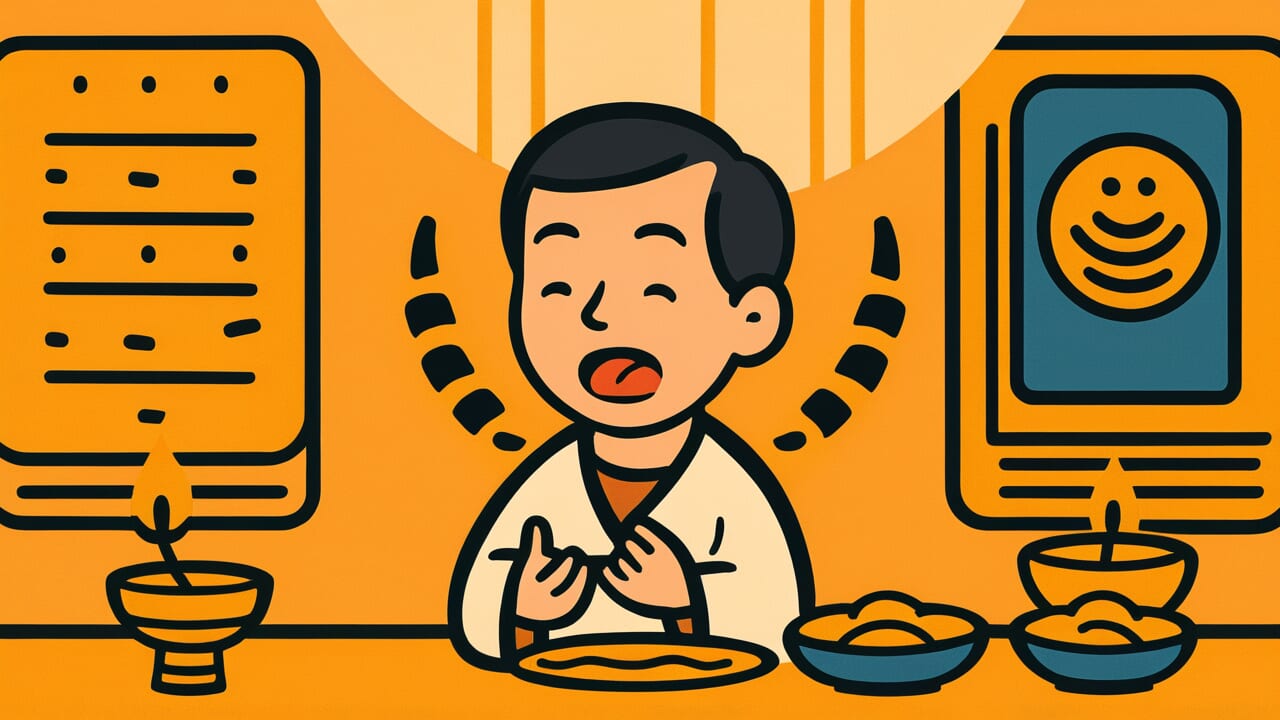How to Read “Food and prayers, one bite at a time”
Kuimono to nenbutsu wa hitokuchi zutsu
Meaning of “Food and prayers, one bite at a time”
This proverb teaches that both eating and reciting prayers should be done carefully, one at a time, without rushing.
Whether you’re putting food in your mouth or chanting Buddhist prayers, you should do it one bite at a time, one phrase at a time, with full attention and care.
Today, we often think about other things while doing something, or try to handle multiple tasks at once.
However, this proverb teaches the importance of focusing on what’s in front of you and doing each thing carefully and thoroughly.
When you rush through things, they become sloppy, and you lose sight of their true meaning and value. This is the warning this proverb gives us.
What’s especially important is that the same level of care is required for everyday acts like eating and spiritual acts like prayer.
The message is that approaching every action with sincerity enriches your life, no matter how ordinary or sacred that action might be.
Origin and Etymology
The exact first appearance of this proverb in literature is unclear, but its structure reveals an interesting background.
The distinctive feature is how it pairs two seemingly unrelated actions: eating food and reciting prayers.
During times when Buddhism was deeply rooted in common people’s lives, chanting prayers was a daily act of faith.
Nenbutsu, the practice of calling upon Amida Buddha’s name, was meant to be recited carefully, with heart in each phrase.
Chanting hastily or carelessly was seen as a lack of devotion.
Meanwhile, eating was also viewed not merely as nutrition, but as a sacred act of receiving life.
In Zen Buddhist meal practices, savoring each bite and eating with gratitude is emphasized.
This proverb likely teaches the importance of doing everything carefully and thoroughly by contrasting these two “actions that should be done with care.”
By pairing the spiritual act of prayer with the physical act of eating, it expresses that care is needed for both mind and body.
This is a proverb born from the lived experience of common people, containing practical wisdom.
Usage Examples
- When making tea, I treasure each movement with the spirit of “Food and prayers, one bite at a time”
- Even when work is piling up, I remind myself “Food and prayers, one bite at a time” and tackle the task right in front of me first
Universal Wisdom
The universal truth shown by “Food and prayers, one bite at a time” is that humans have always known how difficult it is to focus on “this present moment,” and how important it is.
We are creatures who constantly want to rush ahead. We think about our next appointment while eating, and worry about other things while working on one task.
This state of “mind not being present” isn’t unique to modern times. It’s a quality humans have always struggled with.
That’s exactly why this proverb was created and passed down through generations.
Our ancestors knew that rushing and doing things carefully cannot coexist.
One bite of food, one phrase of prayer—without putting your heart into that moment, they become mere mechanical motions.
And what’s done mechanically leaves nothing in your heart or body.
This proverb pairs contrasting actions—eating and prayer—to teach that the same attitude is needed in all aspects of life.
Sacred things and ordinary things all equally require care. Our ancestors understood that this is what it means to live as a human being.
When AI Hears This
The human brain has what’s called “working memory,” a temporary information processing space, and its capacity is surprisingly small.
Cognitive psychologist George Miller’s research found that humans can hold about seven chunks of information simultaneously. Recent studies suggest it’s even fewer—around four.
This proverb points to exactly this limitation.
The act of eating looks simple but actually requires complex cognitive processing.
Timing your chewing, deciding when to swallow, monitoring heat and taste, being careful not to choke—multiple processes run simultaneously.
Meanwhile, chanting prayers requires recalling memorized words, controlling pronunciation, and concentrating on meaning.
When you try to do both at once, your brain must divide its limited attention resources in two.
What’s interesting is the “quality degradation” caused by this resource division.
Modern research shows that multitasking reduces processing speed for each task by up to 40 percent and increases error rates.
In other words, you can’t taste your food properly, and your prayers lack sincerity.
This proverb offers a solution by showing a specific unit—”one bite at a time”—that divides cognitive load into minimal units.
In an era without neuroscience knowledge, people verbalized the optimal cognitive strategy through experience.
Lessons for Today
What this proverb teaches you today is a way of life that values quality over speed.
In our pursuit of efficiency and productivity, we tend to neglect what’s right in front of us.
But what truly matters isn’t how many things you accomplish, but how much heart you put into each one.
Your morning coffee, conversations with family, a single task at work—try approaching all of these with the spirit of “one bite at a time.”
Don’t rush, don’t panic, focus on this present moment. By doing so, the same amount of time becomes richer and more meaningful.
In an era when multitasking is considered a virtue, this proverb’s value has only increased.
Have the courage to focus on one thing. This isn’t inefficient at all.
Rather, it’s the most reliable way to bring depth and fulfillment to your life.
Living carefully is also a way of cherishing yourself.



Comments